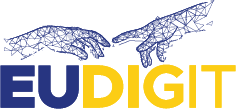You are here
Methodology
Activity plan / work program of the project
The working method of EUDIGIT can be detailed as follows:
Expert’s and Citizen’s commitees
Partner cities will commit to gathering NGOs and citizens for the whole duration of the project (and beyond); 6 EUDIGIT Expert’s Committees will be set up in the 5 cities and will favor exchanges between cities experts and NGOs. The Steering Committees will be in charge of working on the states of play and preparing events (intermediary workshops and seminars).
In parallel, cities will invite the population to join the Citizens' Committees in order
to underlight their problems and express their needs, from the bottom to the top thanks to 30 planned intermediary workshops (6 cities x 5 topics).
Topics chosen
Five topics have been chosen by cities: youth, elderly, disabled, urban/rural, communication. Before each seminar, each city must realize its own state of play in order to give everyone a good vision of the local situation (public policies, NGOs and citizen’s involvement, citizen’s needs, issues and challenges, good practices...) and assess the impact on EU citizenship and citizen’s awareness to EU rights and opportunities.
Conferences and seminars
Two conferences will be organized at the beginning and at the end of the project. Meanwhile, 5 intermediate seminars will present the situation by theme and by city.
Best practices, problems and challenges will be highlighted with the support of experts and the testimony of citizens; an e-book will be delivered after each seminar and will focus mainly on recommendations.
The opening conference (webinar) in Marseille will give the floor to all the partner cities to present :
- Their digital portrait,
- Social challenges and the appropriate responses,
- Their digital strategies,
- Their local actions in order to support the EU citizenship and citizen acceptance to EU project.
The final conference will sum up all the work done by the partners, NGOs and citizens.
The five E-Books will be presented. A common declaration for cooperation between partner cities will be signed (and potentially open to new cities).
Dissemination
EUDIGIT will count on recognizable and dedicated communication tools such as logo, visual identity, dedicated campaigns in digital and social media, press conferences and newsletter. A web page will present the project, all partners, specific objectives, events program, and will gather best practices and recommendations to EU cities. EUDIGIT will also be promoted by the 6 cities and NGOs websites.
An E-book will be released after each webinar These will be accessible online and sent by e-mail to participants. They will be available in seven languages and if possible adapted to specific targets. Participants will be able to find a state of play related to the topic, best practices and challenges in cities, a summary of the information and advice given during the seminars, numerous avenues for further study on the subject. The most relevant recommendations made by the participants and information from the European union on the theme addressed, as well as on a better knowledge on the EU and access to the rights and opportunities for citizens. The objective here is to allow both a continuity of the project and to involve citizens in a participatory approach.
Through these means, we hope to reach a total of more than 30 000 people indirectly, whether thanks to online distribution, word of mouth or local media.
The results of the project will be delivered at the European level through the participation in forums such as the Futurium (WIFI4EU community, Urban Agenda of the EU - https://ec.europa.eu/futurium/en) or events that will be identified by the partnership.
Thanks to the support of cities/local authorities networks (TheMayor.EU, Euro cities...) in Europe and in each participating country, key-actors in the communication with citizens (Europe Direct info centers, representations of the EU in Marseille and in partner cities/countries...) or dedicated tools such as the “Citizens' App“.





